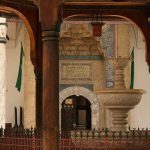There is hardly a single place in BiH that does not have something in common with Austria, from buildings, to people and companies. Same is true for Austria: in almost every single Austrian city, as Ambassador Pammer explained, there is at least small population of BH citizens, in some cities, these groups are quite sizeable. In Vienna, for example, there are over 100,000 people from Bosnia and Herzegovina and over 200,000 in the entire country. There are over 20 active associations of citizens of Bosnia and Herzegovina in Austria, and the people of Bosnia and Herzegovina play an active and prominent part in Austrian economy and culture.

Interviewed by: Elma Zećo
Photo by: Edvin Kalić
Having an interview with Ambassador who speaks your own language is not something that happens every day. However, if you do come across the Ambassador of Austria to BiH, H.E. Mr. Martin Pammer, you are bound to be impressed. It was his own personal ambition to master the local language of each country in which he served. As a result, as his service in Montenegro commenced, his own mission to explore and master the languages spoken by the peoples of former Yugoslavia kicked off. He even modestly claims that he speaks the languages as if he was a “gastarbeiter” in this country.
Year of Culture Austria – BiH 2016, organised under the slogan: “Let’s get to know each other better”, included various areas of cultural and intellectual work. It is now drawing to an end. Are you satisfied with the way it was organised and the results it accomplished?
The Year of Culture 2016 was conceived as a two-way event, focusing on presenting Austria in BiH, with emphasis on modern-day Austria and presenting BiH in Austria in the same way. The purpose of this effort was to improve the image and enable the citizens to get to know these countries better. I believe we succeeded. With over 100 events organised in both countries, 80 events in BiH alone, we presented visual arts, architecture, literature and music. We also organised conferences, focusing on mutual perception, role of Islam in Austria and BiH, issues of women and society, different modes of cooperation between similar institutions in our countries, and provision of support to important cultural institutions in BiH, such as the National Museum of Bosnia and Herzegovina and Sarajevo Philharmonic Orchestra. We also organised many events to launch new books, establish partnership with artists and sign cooperation agreements in the area of science and technology, as well as culture.

Could you tell us more about the planned future projects?
In December, we are opening a photo exhibition in Mostar and Sarajevo to showcase the work of young photographers from Graz and Styria (Steiermark). We are also opening a new Austrian Institute in Sarajevo on 13 December. On 5 December, we are opening a concert season with a performance of a renowned pianist Bartolomej Stanković, under the title “Balkan Madness”. In continuation, composers and music from BiH will be presented, featuring different genres, from classical music to sevdah and jazz – the kind of music that has never been experienced in Austria before. This will in essence represent a continuation of the sequence of performances, which commenced with the concert of Sarajevo Philharmonic Orchestra in Vienna, organised on 29 November 2016. Starting next year, Austria will take over the chairmanship of the OSCE, and in 2018, it will assume the presidency of the EU Council. We will continue building bridges and fostering cultural and personal exchange. It is for that reason that in addition to the Embassy of Austria, our country has also opened in BiH the Office of Austrian Chamber of Commerce, the Liaison Office of the City of Vienna, Austrian Office for Cooperation in the Area of Education, Austrian Cultural Association, Austrian Libraries Association and the previously mentioned Austrian Institute.
What do Austrians know about BiH?
In addition to the events that transpired 100 years ago, they quite possibly know who Ivica Osim is; they have most likely heard of other famous athletes and are familiar with the folk music. Little is known about the fact that Sarajevo, Mostar and Banja Luka foster a vibrant cultural scene and that the capital of BiH used to be the centre of cultural life in the former Yugoslavia. This city is a home of excellent graphic arts. In addition, the country has its success stories in the area of business. For instance, the wood processing industry which thrives here, exports its products to Austria, France and Sweden.

How many Austrian firms operate in BiH and which stand out as the most successful ones?
There are about 440 Austrian companies operating in BiH. Out of the total, the companies providing financial consulting and construction services have the strongest presence. There are many companies active in the area of manufacturing. Derventa, where 13 Austrian high-tech companies successfully operate using the advantages BiH has to offer, is an excellent example. These companies brought in the work ethics highly valued back home in their founding companies and generated 750 jobs.

What does your life look like now that you are based in Sarajevo and how do you describe this town to your friends?
My guests always find Sarajevo and BiH fascinating, because this is the meeting place of the West, the East, the North and the South. Sarajevo is one of the most interesting cities in the world. Few other cities offer such architectural diversity, displaying visible remnants of the Ottoman era, the Viennese style Western architecture, Yugoslav architecture and finally, modern architecture. Its position is ideal. Opportunities for skiing and hiking are well within reach, while it also does not take long to get to the coast. That is what attracts people. Guests are interested in the historic places, such as Sarajevo as the place of the assassination, or Sarajevo as the Olympic city. People also love the food and the fascinating sevdah music. Put simply, the blend this city is all about is both unique and invaluable. I enjoy being the representative of Austria in BiH. My official life is satisfactory, though very busy. When I have some time to spare, I engage into sports: I ski, hike, ride or workout. I also like to attend cultural events. Sarajevo Philharmonic Orchestra is great; I know the language well enough to be able to enjoy a theatre play now and then. Night life is also great, with incredibly versatile offer, from jazz to folk music. I wish a day could last more than just 24 hours.

In which countries have you served in the past, before coming to BiH, and which country would you like to go to from here?
I have served in Slovenia, Croatia, Hungary, Montenegro, and I also lived in Canada and Italy. For me, it would be interesting to go to South America, India or some of the countries in Africa. In this line of work, it would be interesting to go somewhere far away, to a remote and exotic place, but also of interest are the countries in which one’s home country has great presence, where one can make a difference and visible improvement. Vienna will be my next destination. In our diplomatic service, it is common to have two foreign assignments followed by one assignment at home. I do not know where my next international assignment will be, but I would certainly enjoy a new experience. I would probably apply for a job in Argentina or Columbia.




